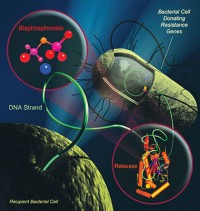The researchers used for the first time a protein that gives bacteria resistance to antibiotics and created new derivatives of antibiotics that the bacteria cannot neutralize. The development will be presented tomorrow as part of a special seminar to be held by the School of Chemistry at Tel Aviv University for high school students from around the country

One of the biggest problems in medicine stems from the fact that antibiotic drugs lose their ability to fight bacteria in a short time as a result of the accelerated development of bacteria that have mechanisms that neutralize the antibiotics.
Dr. Micha Friedman from the School of Chemistry in the Sackler Faculty of Exact Sciences at Tel Aviv University and his research partner from the University of Michigan in Ann Arbor, USA, Dr. Sylvie Garno-Tsudikova, are now reporting on progress in the development of new antibiotics that are able to fight bacteria that have developed resistance to antibiotics, including Pathogenic bacteria common in hospitals. The development will be presented tomorrow as part of a seminar that the School of Chemistry will hold for students from 15 high schools across the country with the aim of bringing them closer to the science of chemistry. The conference will be opened by the Minister of Science Professor Daniel Hershkowitz.
In another article describing the results of the research that was accepted this week for publication in the journal Organic and Biomolecular Chemistry, Dr. Friedman and his colleagues write that, with the help of a targeted change in existing aminoglycoside antibiotics (Tobramycin, Paromomycin), they were able to return them to activity against bacteria that had already developed resistance to this type of antibiotics.
Dr. Friedman explains: "The bacteria know how to locate the antibiotics with the help of proteins (enzymes), and through a chemical change in a suitable position in the drug, they neutralize its activity. The idea was to bind a chemical group to a specific position in the drug and by this strategy prevent it from being neutralized by the enzyme. In our current study and in previous studies, we developed chemical and biochemical methods with the aim of blocking the antibiotic position, which changes the enzyme that confers resistance to bacteria. This action has two advantages: firstly, the position is blocked and the bacterium has no way to neutralize the new antibiotic, and secondly, the substance that binds to the antibiotic allows it to carry out the action of destroying the bacterium effectively."
Since the publication of the initial findings about a year ago, Dr. Friedman and his partners in the USA succeeded in developing a chemical way for the efficient production of a number of molecules that served as prototypes for the new antibiotics they developed and to test its effect on bacteria of many strains, including resistant and pathogenic bacteria (disease-causing) that cause infections and which are common in hospitals and cause morbidity and mortality. The aim of the research is to extend the life of the existing antibiotic drugs by chemically adapting them to deal with resistance mechanisms against antibiotics in violent bacterial strains.
Dr. Friedman estimates that this is the first time that the mechanism of a bacterium against antibiotics has been used in order to produce the next strain of antibiotics as an approach to developing new antibiotics. "This is another and important layer in the overall basket of developing strategies for the preparation of the next generations of antibiotics as weapons against the resistance of bacteria to existing antibiotics. This is important because bacterial infections are still one of the leading causes of death nowadays, concludes Dr. Friedman.

8 תגובות
What would we do without the prophets who will never predict how the new antibiotic will be developed but will always predict how it will not work.
Roni, the reason there is no excitement here is because there is nothing. As commenter number 2 wrote, there is no revolution here that will result in the elimination of all bacteria in the world. All that is here is a new type of antibiotic, which can work successfully until the bacteria get used to it as well. It is simply "another weapon", as they defined it in the article, and it will be effective until the bacteria develop resistance to it as well.
It seems to me that there is a lack of excitement here, after all if this thing is practical it is a huge discovery!
Therefore, it seems to me that the explanation is that it is not friendly to humans yet and therefore the idea is good, but not applicable.
(Of course I'm just shooting in the dark.)
Commenter #2 is right. We will see how long it will take for the bacteria to "develop" strategies that will also overcome the new obstacle and God forbid
I'd rather see progress in the field of bacteriophages.
The next Nobel Prize?
The researchers did not develop any "method that neutralizes the bacterium's ability to create resistance to antibiotics" but instead developed a successful method to produce a version of an antibiotic that the bacterium has developed resistance to that it is currently not resistant to.
The main problem is lateral transfer of resistance by plasmids
Any modification of antibiotics helps temporarily.